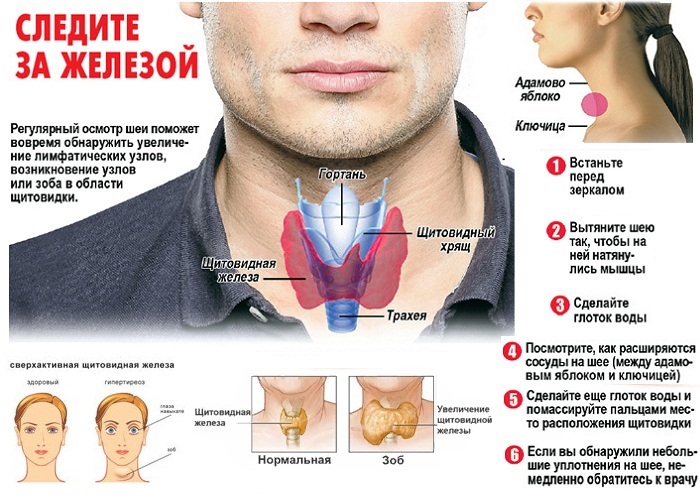This article will discuss how at home you can independently and without analyzes diagnose the presence of diseases or problems with the thyroid gland.
Content
- How to determine the disease and problems with the thyroid gland yourself, without analyzes at home: Test
- Problems with the thyroid gland: how to diagnose, check the health of the thyroid gland with iodine?
- How to understand whether there are problems with the thyroid gland: 18 dangerous symptoms
- Problems with the thyroid gland: symptoms for diseases
- Video: The first symptoms and problems with the thyroid gland that cannot be ignored!
The thyroid gland or thyroid is the main iron, which is located in the lower neck, below Adam's apple. It consists of two shares that are in contact a little below the middle of the Isthmus, which is concentrated immediately in front of the trachea. The thyroid gland produces the necessary iodine -containing hormones that help regulate metabolism, heart rate and intestinal operation, blood pressure and treatment, as well as temperature.
And any problems with the thyroid gland immediately give crushing impulses to any system and organ of our body. Therefore, it is so important to catch this calls in time in order to do their timely treatment!
How to determine the disease and problems with the thyroid gland yourself, without analyzes at home: Test
There is a few way to check to identify diseases or problems with the thyroid gland at home.
- With a mirror and water.In this method, you can determine an increase in the thyroid gland yourself without analyzes and at home. To do this, keep the mirror so that you can see part of the neck between the larynx and the collarbone in front of you. Then take a sip of water, raising your head slightly. The first thing that should alert you is the absence of a dimple above the collarbone. If when swallowing you observe a clear protrusion or some balls, then this is a good reason to consult a specialist.
- Using a thermometer.To confirm your suspicions, you can measure your body temperature 3 times a day and, at least 20 minutes after eating. You need to measure in the tongue and compare the values. If there are any noticeable fluctuations, then your thyroid gland may not work as it should.
- Using an ordinary handle.If you have problems with the thyroid gland, your hair begins to fall out. And first of all, this happens on the eyebrows. In addition, there is a certain protrusion of eyeballs. To check the presence of the disease with a pen, attach it to the outer corner of the eye and keep it strictly parallel to the nose. Everything is fine if the edge of the eyebrow goes beyond the pen.
Important: all these symptoms cannot give you a 100% guarantee of the presence or absence of a disease. Let's just say these are the first dangerous signals that require a trip to the hospital, or rather to the endocrinologist!

Problems with the thyroid gland: how to diagnose, check the health of the thyroid gland with iodine?
Problems with the thyroid gland, first of all, are associated precisely with iodine deficiency in the body!
- So, lower the cotton swab into the bottle with iodine and draw on the wrist A mesh of about 4x4 cm in size. Inspect this area After 2.5 hours. If the grid has disappeared, then your body suffers from a lack of iodine. If there are still traces, then everything is in order.
- To determine more accurately iodine deficiency, draw on the inside of the hand Three small strips with iodine: one is very thin; The second is thicker, and draw 2 times; And the third is quite thick, about 1 cm wide, and go through a wand 3 times. It is recommended to do this before bedtime. The results will be available at once in the morning. If only the thinnest strip has disappeared, then you should not worry. But if all the strips have disappeared, then you need to consult with a specialist. You need to undergo laboratory tests and ultrasound scanning of the thyroid gland.

How to understand whether there are problems with the thyroid gland: 18 dangerous symptoms
Our body reacts to any changes and diseases, as well as to problems with the thyroid gland. Therefore, be careful and test yourself with these symptoms. If at least some are observed with you, then you should seek help from a specialist. Moreover, if there are anxious results from home tests and experiments.
The following symptoms indicate problems with the thyroid gland:
- Depressive state, increased irritability or tearfulness, as well as emotional instability. It is also worth separating-with hypothyroidism due to a lack of serotonin, a person is more sad, resentment increases and every little thing causes tears in his eyes. And hyperthyroidism is an excess of serotonin. But not joy covers a person, but excessive irritability, nervousness and strong emotionality.
- Sleep problems and general fatigue, excessive fatigue, Which only worsen when you cannot sleep well at night. Do not worry, not every tired yawn will indicate thyroid dysfunction. However, if you feel constant drowsiness for a long period of time, then this is a thyroid signal! And sometimes the general apathy is so great that it even affects everyday life. It is worth dividing the symptoms a little:
- hypothyroidism - You wake up exhausted even after eight or more hours of sleep. At the same time, you sleep for a long time, and on weekends you have "marathon" sleep sessions
- hyperthyroidism or thyroid hyperfunction “It's hard for you to fall asleep.” You wake up several times a night. You also experience a rapid heartbeat or anxiety before going to bed
- Weak memory and loss of attention, concentration. If there are too few hormones in the body, many people suffer from poor memory, as well as some kind of inhibitment and nebula of thinking. Hyperfunction - if the function of the thyroid gland is significantly increased, this may even lead to impaired perception and concentration.

We also recommend reading our article "TTG - what is it and what is its norm?"
- Dry skin and brittle nails, hair- This is the main symptoms of a violation of the proper number of hormones. At the same time, we repeat, the hair can start strongly fall out, and can also be observed Skin pigmentation. If symptoms occur not only due to the abundant taking of sunbathing, it is also recommended to examine the thyroid gland.
- Extreme weight fluctuations. Sudden leaps of weight are often associated with an unbalanced level of hormones and should be tested by a doctor. With hypothyroidism, you may gain weight. At the same time, it is not possible to reset it even with a diet and physical exertion. With hyperthyroidism, you can greatly lose weight with good or even too high -high diet.
- Taste preferences in food and appetite itself are changing. Very often, an excess of hormones causes a constant feeling of hunger, but the weight gain does not occur. Apathy, on the other hand, repels the desire to eat, but the person is recovering simply from the air!
- Sharp fluctuations in body temperature. Sometimes you are wet from sweat, then tremble again from the cold, regardless of the surrounding conditions. Such fluctuations in the temperature sensation for a short period of time and without any special physical exertion are not normal and indicate a metabolic disorder.
- Muscle pain and cramps. Even a small voltage does not necessarily mean thyroid dysfunction, but it may indicate it. If the thyroid gland does not produce a sufficient number of hormones, this negatively affects metabolic processes. Hyperfunction increases the degradation of protein in the muscles. With hypothyroidism, the reverse process is underway, but the result is the same - the muscles become weak and hurt. Also possible numbness or tingling In the lower regions.

- Trembling legs and tremor of the hands. Most often occurs with an excess of hormones. The main functions in the body are accelerated, emotional instability increases, which causes trembling. But it can be observed against the background of hormonal deficiency.
- Unregular pulse and rapid palpitations, as well as pressure surges.Hypothyroidism - if the thyroid gland produces too little hormone, the heartbeat also slows down. The patient feels shortness of breath, rapid fatigue, and the pressure drops sharply. But after even a small load - the heart rhythm is rising above 80 beats per minute. In the long run, this can lead to heart failure. In the case of excessive function, the impulse is often much higher than it should be. Then the heart begins to work faster, and the heartbeat is sometimes felt irregularly.
- All this can cause Frequent and protracted headaches.
- Problems with the intestines. The last thing you can think about when you have digestive problems is your thyroid gland. But gastrointestinal symptoms are common, enhancing the far-reaching consequences of this important gland. With hypothyroidism, you may have serious or long -term constipation that cannot be treated. With hyperthyroidism, you may have diarrhea, liquid stool or irritable bowel syndrome.
- Swelling of the eyelids, faces and limbs. Of course, this is a symptom of not only a thyroid failure, but also renal failure. But disorders in the work of the heart and in general metabolism, digestion and blood circulation often cause swelling, especially in the morning.

- Infertility and problematic menstruation. Thyroid diseases, especially hypothyroidism, can increase the risk of infertility, interfering with the success of auxiliary reproductive procedures and increasing the likelihood of re -miscarriage. It is also worth noting that the abundance of hormones causes a cycle failure, and their deficiency - minimizes the discharge itself.
- Problems with eyes and vision changes. General symptoms include: dry eyes, sand feeling in the eye, fuzzy vision, redness of the eyes, swollen or watery eyes, sensitivity to light. One of the dangerous symptoms is protrusion of the eyeball or bungage.
- Edema on the neck or protrusion of a thyroid butterfly. The disease of the thyroid gland is also the cause of the swollen neck. With iodine deficiency, the endocrine gland increases and forms the so -called goiter, which is usually well felt and even noticeable.
- Interest in sex disappears, and men are possible with potency problems. Hormones are responsible for our attraction! Therefore, indifference is not against the backdrop of fatigue to the intimate area can indicate thyroid problems.
- Sensations of a coma in the throat, sore or hoarseness on an ongoing basis. This is not necessarily, but often indicates a failure in the work of the thyroid gland. We also offer you to read our article on the topic "What is talking about and how to get rid of a coma in the throat?"

Problems with the thyroid gland: symptoms for diseases
All of the above symptoms can be associated with hyperthyroidism, hypothyroidism, an autoimmune thyroid disease, knots, goitations (increased thyroid gland) and thyroid cancer. Therefore, in order to share problems with the thyroid gland, we suggest dividing them by disease.
- The thyroid disorder can cause a number of symptoms such as severe sweating, palpitations, poor concentration and swollen legs. The body temperature is also regulated by thyroid hormones. That is why patients often suffer from strong tides. Moreover, they usually suffer for years, Before they can find problems with the thyroid gland. Then this is the only reason that can cause such different complaints in the body.
- The thyroid disease includes several diagnoses. At the same time, the general categories of symptoms of thyroid ailment, such as changes in sleep, weight or problems with the intestines, may partially match. But it is precisely how they appear that is completely different from a state to a state. In fact, symptoms of hyperthyroidism (hyperactive thyroid gland) and hypothyroidism, the two most common types of thyroid diseases are often opposite! Although they affect the same body system.
- In addition, such problems with the thyroid gland as goiter, thyroid cancer, as well as certain options for hypothyroidism and hyperthyroidism, such as Graves, can cause other symptoms that will be unique or more pronounced with these diagnoses.

General symptoms:
- Feeling of edema or fullness in the neck
- A noticeably enlarged neck
- It is uncomfortable to wear turtlenecks
- It is unpleasant and hard to wear ties
- Difficulties with swallowing
- Difficulty with breathing
- Hoarse voice
The edema of the neck is often a symptom of thyroid disease, but it can also indicate a more serious condition, including certain types of cancer, infection or neurological diseases. If the area of \u200b\u200byour neck is increased, see a doctor immediately!
The warning signs of the thyroid gland can be well perceived by you. All changes that occur during insufficient or excessive functioning are usually very obvious to outsiders. This is not always the case with nodes and goiter. Therefore, it is important to recognize their symptoms so that they can be attributed to a thyroid disorder.

Hormone hypothyroidism and deficiency:
- speak more slowly than usual
- thinking and understanding the explanations worse than before
- we gained weight
- loose or "chubby" look on the face
- you constantly freeze, although it is not too cold for others
- you often get tired and sleep much more than usual
- complain about productivity or reduction of concentration
- suffer from constipation, hair loss or rough skin
- there is a depressive state
Hormones hyperthyroidism and excess:
- especially nervous, possibly aggressive
- accidentally lost weight
- suffer from insomnia
- sweat, although this is not too warm for others
- the state of "confusion from" and exhaustion
- complain about diarrhea or tachycardia
Signs of a goiter or nodes on the thyroid gland:
- swelling of the lower neck, sometimes one -sided
- lump, pressure or tightness in the throat
- dyspnea
- difficult swallowing
Please do not ignore the calls of your body! If you find these symptoms yourself, you should quickly consult a doctor. If you are struggling with the above symptoms, it is best for your doctor to make a blood test. With a simple test, he can find out if you suffer from a thyroid disease. This may be insufficient thyroid activity or hyperthyroidism.








Back in the 17th century, the first experiments began with plants such as white cinquefoil. Even then, people discovered the healing properties of this plant. The cinquefoil contains zinc, magnesium and other necessary trace elements. This plant has a large effect on the thyroid gland: it becomes very clear and correct, all sorts of malfunctions and violations are excluded. And it is the extract of this plant that is included in such a drug as endocrinol. Makes it Evalar, very comfortable capsules
I myself suspected that I have problems with the thyroid gland. Just unpleasant sensations in the neck were (squeezing) and began to get tired strongly, apathy appeared. I went to the endocrinologist, took the tests, it turned out that the thyroid gland was increased. Now I drink Tiramin, a non -hormonal drug (citamin) which normalizes the work of the thyroid gland. Forces returned with him, more energy appeared, it seems like an unpleasant sensation in the throat, and on the last ultrasound and the size of the thyroid gland decreased.